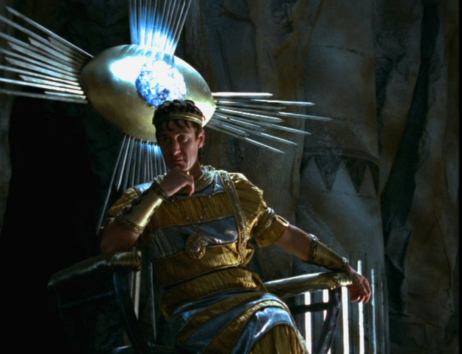| Season two of Xena ends its "water trilogy" with a satyr play, A Comedy of Eros. It doesn't have a water theme, but it does seem to pick up elements from The Trackers of Oxyrhynchus. The connection is unclear at this stage in the show, but when comparing to later, similar episodes, The Quill Is Mightier and Lyre, Lyre, Hearts On Fire (a direct sequel to A Comedy of Eros), the connection becomes clear. At this time, the third season of Hercules was drawing to a close, and its season finale reflects the themes of Xena just as well. Before we get to that, let's look at one of its later episodes, The Lost City. Already, the title evokes the first Hercules movie, Hercules and the Lost Kingdom. We've established in Ulysses that the "Lost Kingdom" draws inspiration from Ithica, as well as Troy: the two kingdoms form bookends for Xena's Odyssey-inspired arc. The Lost City is based on the Lotus Eaters episode from the Odyssey. Remember, though, that these episodes shouldn't just be looked at in retrospect: they do more than just borrow from previous ideas. Like Janus, they face both backwards and forwards, and we should examine how they anticipate future episodes as well.  Hercules' third season finale, Atlantis, is another reprise of The Bacchae, using a similar setting as Lost City, only with a reverse message: this time, instead of religion being used cynically to control others, religion is persecuted by cold rationalists who are just as cynical and controlling. Again, the story seems to pick up from Hercules and the Lost Kingdom, when we meet Cassandra, a native of Atlantis. We know her character from the Trojan war, prophesying the downfall of Troy and the breaching of its giant walls, but no one listened. In this episode, Hercules arrives by boat to the shores of Atlantis. Cassandra, depicted here as a resident of this mythical island kingdom instead of Troy, prophesies that Atlantis will be destroyed, but no one listens because the Atlantians regard their civilization as culturally sophisticated and technologically advanced, with no need of the gods, or of prophecy to guide them. As we'll see, Atlantis is also a city of the cyclops; according to chapter 82 of The Greek Myths, Silenus revealed the secret of Atlantis to King Midas, who then helped Silenus return to the army of Dionysus. In reward, Dionysus gave King Midas the gift of turning everything he touched into gold. Perhaps this concept was borrowed in part for The Lost City, since their quarry is gold, and its easy availability comes at a heavy price. Even Salmoneues loses his taste for it, as King Midas does! Silenus is one of two besides Plato who talked of Atlantis: the other is Solon. The king of this technological Atlantis is Panthius, whose name is barely changed from the brash young king of The Bacchae , Penthius. The Stranger here is Hercules himself; we recall the quote from The Bacchae, when Pentheus describes the Stranger: "People say some stranger has arrived, a sorcerer, a Lydian casting spells, his long blond hair perfumed, his cheeks as red as wine, his eyes with the charm of Aphrodite's." Like Dionysus, Hercules is a demigod, and bristles when Panthius makes arrogant statements about religion: "In Atlantis, order and progress are supreme. You might say they're *our* religion." Hercules replies: "Well, maybe it's about time to think about converting." Panthius doesn't think much of Cassandra for upsetting his well-ordered society. Like the Yogi of The Lost City, he tells his citizens there's no need for the barbaric influence of the outside world; they have everything they need on the island (sounding very much like the Cyclops of Euripides' play, who considers himself a self-sufficient god!). Anybody who believes in the gods is weak, and there are no weak in Atlantis, the king declares. Panthius and his court are smug rationalists; his court is full of effetes, intellectual and inexperienced, sheltered from chaos. Panthius's vision of the future as dominated by science and devoid of faith is weak compared to Hercules' strength of faith in his friend, Cassandra.  With this retelling of The Bacchae, both Hercules and Xena leave behind their purely episodic approach, and switch to season-long arcs, the first of which involve the Rosemary's Baby-inspired arc on Xena, to be tied into the "Twilight of the Gods" arc on "Hercules. Because of an illness suffered by its star, Hercules had to postpone much of its originally intended arc, continuing to a certain extent with the episodic approach until its much darker fifth season could bring it to conclusion; the change was mostly superficial, however. The longer arcs would not change the series' use of the sources and motifs already introduced: instead, they would simply employ them in the arcs, and would be less noticeable as a result. All the attention of the audience would go towards tracking the developing plots each week; had the show continued to rely on stand-alone episodes, the patterns would have eventually have been hard to ignore. |